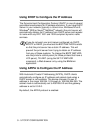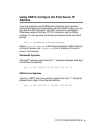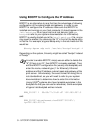
9 - 9 TCP/IP CONFIGURATION
Using BOOTP to Configure the IP Address
BOOTP is an alternative to rarp that has the advantage of allowing
configuration of the subnet mask and gateway. In order to use
BOOTP to configure the IP address make sure that BOOTP is
installed and running on your host computer (it should appear in the
/etc/services file on your host as a real service; type man
bootpd or refer to your system documentation for information).
BOOTP is usually started up via the /etc/inetd.conf file, so you
may need to enable it by removing the "#" in front of the bootp entry
in that file. For example, a typical bootp entry in the /etc/inetd.conf file
would be:
#bootp dgram udp wait /usr/etc/bootpd bootpd -i
Depending on the system, this entry might be called "bootps" instead
of "bootp".
BRN_310107 1 00:80:77:31:01:07 192.189.207.3
and:
BRN_310107:ht=ethernet:ha=008077310107:\
ip=192.189.207.3:
In order to enable BOOTP, simply use an editor to delete the
"#" (if there is no "#", then BOOTP is already enabled). Then
edit the BOOTP configuration file (usually /etc/bootptab) and
enter the name, network type (1 for Ethernet), Ethernet
address and the IP address, subnet mask and gateway of the
print server. Unfortunately, the exact format for doing this is
not standardized, so you will need to refer to your system
documentation to determine how to enter this information
(many UNIX
®
systems also have template examples in the
bootptab file that you can use for reference). Some examples
of typical /etc/bootptab entries include:


















